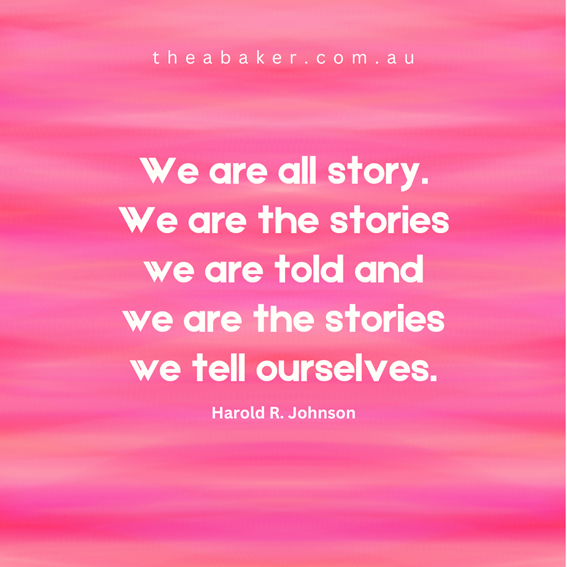The story(ies) of our life
The story(ies) of our life
If you’ve followed this blog for a little while, or you’ve worked with me at any time, you’ll know that I often use analogies in order to illustrate or explain psychological concepts, or as a means to engage in discussions about trauma without activating any specific memories. Analogies (or metaphors) are essentially the creation of a ‘story’ to bring an experience or concept to life – and when we land on a really useful one it can really make such a difference to how we remember and engage with our inner-world and experiences. You’ll already know plenty of these sorts of analogies – like the one about putting your own oxygen mask on first when we try to illustrate the need to prioritise your own health / needs, or even the idea about life being like a ‘choose your own adventure’ book – you can make choices and decisions, but you can’t always predict where those choices will take you.
I sometimes get a bit carried away with the imagery in session – it’s just the way my brain retains information! There’s one that I use often which I’ve adapted from something that is used within Acceptance Commitment Therapy (ACT) and Internal Family Systems (IFS) (though with slightly different meanings), and I think it’s a really great illustration of how we use this sort of story-creation. Let me explain. As I’ve written in different blogs, (HERE and HERE) we all have different parts that make up our inner-world and depending on their role and function they might cause us to feel, think and behave in quite diverse and possibly (at least superficially) quite contradictory ways. The metaphor I use to illustrate this concept probably dates me, but I explain that these parts are like all the various Muppets on The Electric Mayhem bus. And just like The Muppets, we all have our versions of a pragmatic ‘Kermit’, emotionally temperamental ‘Miss Piggy’, frenzied and uncontained ‘Animal’ and loyal hardworking ‘Scooter’.

Unlike the rag-tag collection of Muppets on their bus, who were driven by the insecure comedian ‘Fozzie Bear’ in the movie I remember from my childhood, we need our embodied, adult ‘Self’ driving our person bus of Muppets.
This metaphor helps to create a safe (and in the case of the Muppets, hopefully humorous) framework within in which to explore our own parts, how we identify with them, and indeed how we might be able to navigate novel ways to relate to them.
These stories help us make sense of our experiences. I use the word ‘story’ very deliberately, and I use it often in session too. Because the meaning we ascribe to our experiences (both enjoyable and traumatic) is something that we ‘create’, just as we write / create stories. Sometimes these stories were written / formed before we were born (in the case of intergenerational trauma), or when we were a very little baby / infant when we don’t actually have ‘memories’ that help to create the meaning of our early lives – but our nervous system and our emotional response pathways endeavour to make sense out of what we experience and later we create stories (beliefs) that bring those to life in ways that we connect to as older children/adults. Just as stories are written, chapter after chapter, layered one on top of the other in interconnected and dependent ways, so do our perceptions (beliefs) form as a means of making sense of our lived experiences.

We do a lot of work in therapy to help understand our stories and where they have come from – then we learn new ways to interpret them, and when we can, we re-write them. The beautiful book, The Midnight Library by Matt Haig, is a novel that inspired me to approach our lives in this way – if you like reading I highly recommend it! We might see our stories as separate books, lined up along bookshelves (I tend to envisage something like the library from Beauty and the Beast). One of the important things we learn along the way is that we can learn whether or not we decide to take particular stories off the shelf to read. I have a story about being ‘bad’ at maths – it starts when I was maybe eight years old when I could do my maths homework and I remember both of my parents getting irritated with me when I kept getting the answers wrong. Later, at boarding school, I was put into one of the lower streams of maths classes and I lost confidence in my abilities to do maths in an academic setting. Despite being a forty-seven-year-old small business owner and PhD candidate I am still teased within my family for not being very good at maths! It’s one of those stories that I know so well and now, when I’m working with data analysis as part of my PhD research, or I’m struggling to make sense of results I remind myself that I don’t have to take that particular story off the shelf, because I know that if I get engrossed in that well-worn tale I will find it much harder to solve my dilemma in the present. We all need to have a trustworthy librarian-part who ensures that we think twice before taking stories off the shelf!
If you’d like to curiously explore your own stories and would like a safe space to talk about how they may impact your mental health, please get in touch with us: www.theabaker.com.au / hello@theabaker.com.au / 03 9077 8194.
